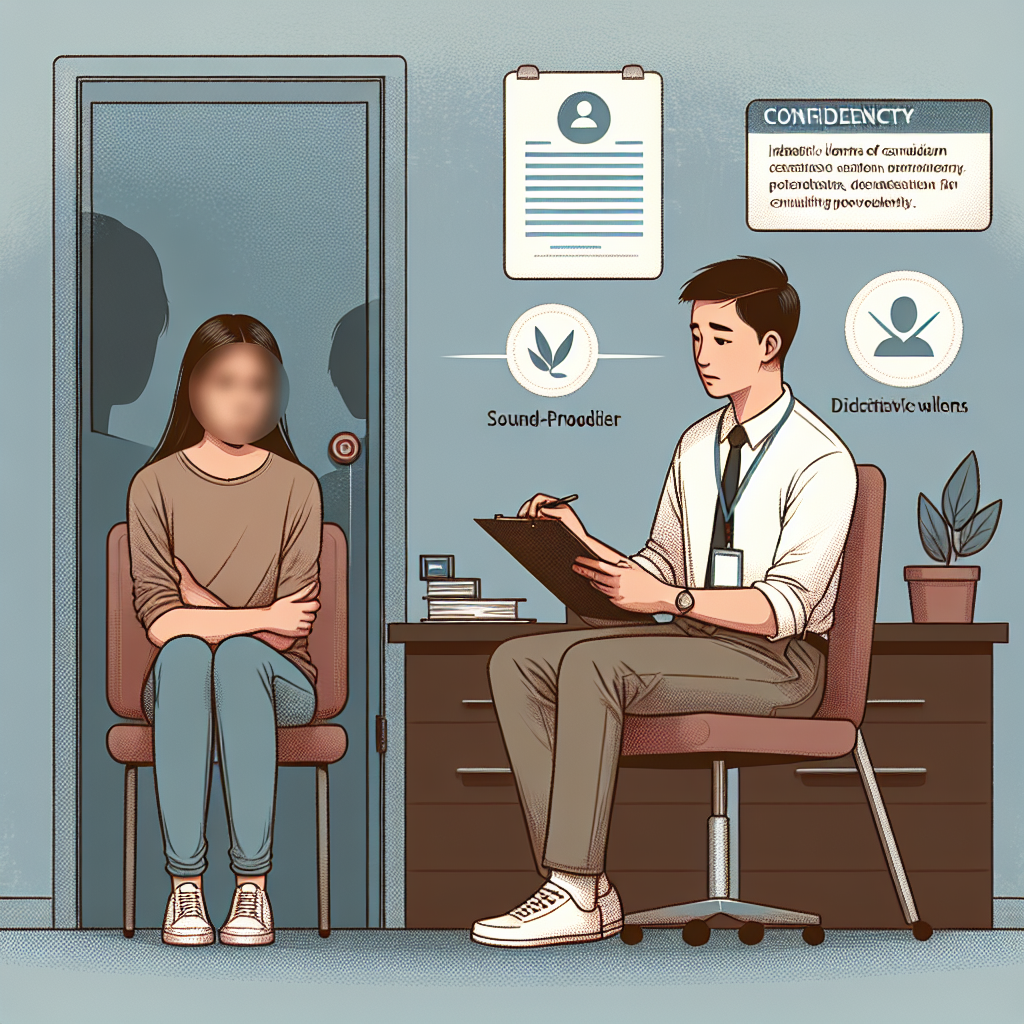-
Table of Contents

“Your Journey, Your Privacy: Trust in Confidential Addiction Recovery Services”
Introduction
Addiction recovery services handle confidentiality with utmost importance to protect the privacy and trust of individuals seeking help. These services adhere to strict legal and ethical guidelines, such as the Health Insurance Portability and Accountability Act (HIPAA) in the United States, which mandates the protection of personal health information. Confidentiality protocols include secure storage of records, limited access to sensitive information, and ensuring that any disclosures are made only with the explicit consent of the individual or as required by law. Staff members are trained to maintain discretion and respect the privacy of clients, fostering a safe and supportive environment for recovery.
The Importance Of Confidentiality In Addiction Recovery Services
Confidentiality is a cornerstone of addiction recovery services, playing a crucial role in fostering trust and encouraging individuals to seek the help they need. When someone decides to embark on the journey of recovery, they are often at their most vulnerable. The assurance that their personal information and struggles will be kept private can make the difference between seeking help and continuing to suffer in silence. Addiction recovery services understand this delicate balance and have implemented stringent measures to ensure confidentiality is maintained at all times.
One of the primary ways addiction recovery services handle confidentiality is through adherence to legal standards and regulations. In the United States, for example, the Health Insurance Portability and Accountability Act (HIPAA) sets the standard for protecting sensitive patient information. This federal law mandates that healthcare providers, including addiction recovery services, implement safeguards to ensure the privacy of individuals’ health information. Additionally, the Confidentiality of Substance Use Disorder Patient Records regulation, often referred to as 42 CFR Part 2, provides extra protections specifically for individuals seeking treatment for substance use disorders. These regulations require that any information disclosed during treatment cannot be shared without the patient’s explicit consent, except under specific, legally defined circumstances.
Beyond legal requirements, addiction recovery services also adopt best practices to maintain confidentiality. Staff members are trained extensively on the importance of privacy and the protocols for handling sensitive information. This training includes understanding the ethical implications of confidentiality and the potential consequences of breaches. By fostering a culture of respect and discretion, these services create an environment where individuals feel safe to open up about their struggles without fear of judgment or exposure.
Moreover, addiction recovery services often utilize secure communication methods to protect patient information. This includes encrypted emails, secure messaging systems, and confidential phone lines. These technological measures ensure that any communication between the patient and the service provider remains private and inaccessible to unauthorized individuals. Additionally, physical records are stored in secure locations, with access limited to authorized personnel only.
The importance of confidentiality in addiction recovery services cannot be overstated. When individuals know that their privacy is protected, they are more likely to be honest and forthcoming about their experiences. This honesty is crucial for effective treatment, as it allows healthcare providers to develop personalized and comprehensive recovery plans. Furthermore, the assurance of confidentiality helps to reduce the stigma associated with addiction. Many individuals fear that seeking help will lead to social ostracization or professional repercussions. By guaranteeing privacy, addiction recovery services help to alleviate these fears, making it easier for individuals to take the first step towards recovery.
In addition to protecting individual privacy, confidentiality also fosters a sense of community within addiction recovery services. Group therapy sessions, for example, rely on mutual trust and respect among participants. When everyone is confident that their shared experiences will remain within the group, they are more likely to engage fully and support one another. This sense of community can be incredibly empowering, providing individuals with the encouragement and motivation they need to continue their recovery journey.
In conclusion, confidentiality is a fundamental aspect of addiction recovery services, essential for building trust, encouraging honesty, and reducing stigma. By adhering to legal standards, implementing best practices, and utilizing secure communication methods, these services ensure that individuals seeking help can do so with confidence. This commitment to privacy not only enhances the effectiveness of treatment but also creates a supportive and empowering environment for all those on the path to recovery.
Methods Used By Addiction Recovery Services To Ensure Client Confidentiality
Addiction recovery services play a crucial role in helping individuals reclaim their lives from the grip of substance abuse. One of the most important aspects of these services is the assurance of confidentiality, which fosters a safe and trusting environment for clients. Ensuring confidentiality is not just a legal obligation but also a moral imperative that underpins the entire recovery process. Various methods are employed by addiction recovery services to safeguard client information, thereby creating a secure space where individuals can openly share their struggles and triumphs.
To begin with, addiction recovery services adhere to stringent legal frameworks designed to protect client information. Laws such as the Health Insurance Portability and Accountability Act (HIPAA) in the United States set rigorous standards for the handling of personal health information. These regulations mandate that any information shared by clients during their treatment must be kept confidential and can only be disclosed under specific, legally defined circumstances. This legal backbone provides a foundational layer of security, ensuring that clients’ personal details are protected from unauthorized access.
In addition to legal requirements, addiction recovery services implement robust internal policies to maintain confidentiality. These policies often include comprehensive training programs for staff members, emphasizing the importance of discretion and the ethical handling of sensitive information. By educating employees about the nuances of confidentiality, recovery centers ensure that everyone from counselors to administrative staff understands their role in protecting client privacy. This collective commitment to confidentiality helps build a culture of trust and respect within the organization.
Moreover, technological safeguards are employed to protect client information in the digital age. Many addiction recovery services utilize secure electronic health record (EHR) systems that are designed with multiple layers of security, including encryption and access controls. These systems ensure that only authorized personnel can access client records, thereby minimizing the risk of data breaches. Additionally, regular audits and security assessments are conducted to identify and address potential vulnerabilities, further bolstering the protection of client information.
Another critical method used to ensure confidentiality is the practice of obtaining informed consent from clients. Before beginning treatment, clients are thoroughly informed about how their information will be used and the circumstances under which it may be disclosed. This transparency empowers clients, allowing them to make informed decisions about their care. It also reinforces the trust between clients and service providers, as clients are assured that their privacy will be respected throughout their recovery journey.
Furthermore, addiction recovery services often employ anonymization techniques to protect client identities. For instance, group therapy sessions may use first names or pseudonyms to ensure that individuals cannot be easily identified. This practice allows clients to share their experiences openly without fear of being recognized outside the treatment setting. Anonymity is particularly important in group settings, where the collective support of peers can be a powerful catalyst for recovery.
In conclusion, the methods used by addiction recovery services to ensure client confidentiality are multifaceted and comprehensive. By adhering to legal standards, implementing internal policies, leveraging technological safeguards, obtaining informed consent, and employing anonymization techniques, these services create a secure and supportive environment for individuals seeking recovery. The assurance of confidentiality not only protects clients’ personal information but also fosters a sense of trust and safety, which is essential for effective treatment. As individuals embark on their journey to recovery, knowing that their privacy is safeguarded can provide the peace of mind needed to focus on healing and growth.
Q&A
1. **Question:** How do addiction recovery services ensure the confidentiality of patient information?
**Answer:** Addiction recovery services ensure the confidentiality of patient information by adhering to federal laws such as the Health Insurance Portability and Accountability Act (HIPAA) and 42 CFR Part 2, which set strict guidelines on the handling, storage, and sharing of patient records.
2. **Question:** Are there any circumstances under which addiction recovery services can disclose patient information without consent?
**Answer:** Yes, addiction recovery services can disclose patient information without consent in specific circumstances such as medical emergencies, reporting suspected child abuse or neglect, complying with court orders, or when the patient poses a serious threat to themselves or others.
Conclusion
Addiction recovery services handle confidentiality by adhering to strict legal and ethical guidelines designed to protect the privacy of individuals seeking help. These services comply with regulations such as the Health Insurance Portability and Accountability Act (HIPAA) in the United States, which mandates the secure handling of personal health information. Confidentiality agreements are typically signed by both the service providers and the clients, ensuring that any disclosed information remains private. Additionally, staff members are trained to maintain discretion and are often required to follow professional codes of conduct that emphasize the importance of confidentiality. This approach helps create a safe and trusting environment, encouraging individuals to seek the help they need without fear of stigma or exposure.



